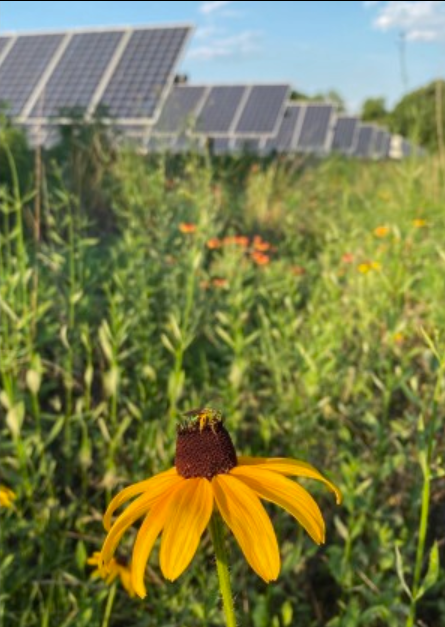Image: Fresh Energy
Written by Aggeliki Marinou, environmental specialist at Wattcrop
Recently, there have been more and more examples of the installation of PV parks on land that is used or could potentially be used for beekeeping. For some time, there has been a prejudice that changing land use to PV farms may negatively affect beekeeping, as no land will be available to beekeepers. Fortunately, this untrue belief has been disproved through research and actual examples showing that the coexistence of beekeeping with a PV park is possible. Solar parks can support insect pollinators by providing them with shelter and critical resources such as flowering plants and other habitats.
 Bees are one of nature’s most important balancers. Their place in the ecosystem is so important that their possible extinction could lead humanity to starvation and death. Unfortunately, in the last 15 years it has been observed that more than 20,000 species of bees worldwide are gradually disappearing and dying.
Bees are one of nature’s most important balancers. Their place in the ecosystem is so important that their possible extinction could lead humanity to starvation and death. Unfortunately, in the last 15 years it has been observed that more than 20,000 species of bees worldwide are gradually disappearing and dying.
The honeybee is an indispensable and unique insect as its role in sustainable development is crucial. It is essential for global food production, as 71 out of 100 crop species are pollinated by bees. So along with the demise of bees will come the end of important crops pollinated by bees. They also play a crucial role in maintaining ecological balance and biodiversity, while helping to reduce pollution. They are harbingers of impending environmental risks and indicators of the health of an ecosystem.
Bees and other pollinators, such as butterflies, face serious risks of extinction due to human activity. Toxic chemical pesticides, land use change and monoculture are major threats to pollinators.
Changing land use for electricity production is not a threat to the bee as their coexistence is possible. Nowadays beekeeping is an activity that occurs with greater frequency in photovoltaic plants. Photovoltaic parks are a protected environment for bees as the biodiversity within the park is higher than in the neighbouring cultivated areas. It also creates a safe zone for pollinators as it improves their health by protecting them from poisoning and habitat loss. It can also provide a safe place for bees and endangered pollinators in general. Bee-friendly parks can do much more for the environment than just produce clean energy as they can create habitats suitable for bees.
Image: Discover magazine & Rob Davis

